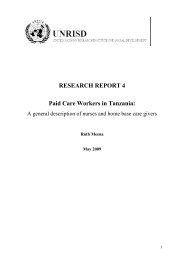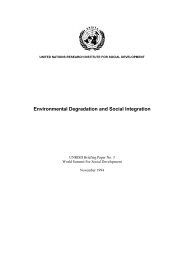Beyond Pragmatism: Appraising UN-Business Partnerships
Beyond Pragmatism: Appraising UN-Business Partnerships
Beyond Pragmatism: Appraising UN-Business Partnerships
Create successful ePaper yourself
Turn your PDF publications into a flip-book with our unique Google optimized e-Paper software.
<strong>UN</strong>RISD PROGRAMME ON MARKETS, BUSINESS AND REGULATION<br />
PAPER NUMBER 1<br />
Is more better? Mainstreaming and scaling-up<br />
Mainstreaming and scaling-up are now regarded by the main promoters of the partnering idea<br />
in the <strong>UN</strong> as both desirable and essential steps. 44 The Global Compact plays a key role in this<br />
regard. It is “uniquely positioned to serve as a key entry point for business to engage in the<br />
work of the Organization. Its light governance structure, combined with operational flexibility<br />
and the focus on pragmatic solution-finding has helped the Compact to become the largest<br />
worldwide initiative of its kind” (United Nations Global Compact 2006b:1). The <strong>UN</strong> System of<br />
Private Sector Focal Points, promoted and serviced by the Global Compact, is itself a<br />
manifestation of the desire to mainstream partnering, with each agency, fund or programme in<br />
the <strong>UN</strong> system encouraged to appoint a member of staff as a focal point.<br />
However, it is also reported that while some <strong>UN</strong> organizations have taken initial steps to<br />
integrate such work into their operations, partnership work in several of them “often remains at<br />
the institutional fringes, conducted parallel to, but disconnected from, the main lines of work”.<br />
It also frequently “remains separate from regular project management in many United Nations<br />
organizations” and they “have not supported their rhetorical commitment to partnerships with<br />
adequate resources (that is, finances, staff etc.)” (Witte and Reinicke 2005:72). <strong>Partnerships</strong> are<br />
developed on an ad hoc basis, often in response to approaches from business, suggesting the<br />
lack of a strategic framework. <strong>UN</strong>ICEF reports that a major constraint in relation to<br />
partnerships is the limited in-house capacity to manage them, and particularly the need to<br />
invest in staff with the experience and skill sets that partnerships require. 45 While collaborative<br />
activity with business has increased considerably in recent years, very few additional staff have<br />
been taken on at headquarters, while country and field offices often lack the expertise and<br />
experience required to deal with this dimension of their work.<br />
The advancing “partnership agenda” is also reflected in the fact that some <strong>UN</strong> organizations,<br />
for example, <strong>UN</strong>DP and <strong>UN</strong>ICEF, have established “portfolios” of projects offering potential<br />
partners a range of opportunities to work with them. However, it is not clear that the <strong>UN</strong> would<br />
have the resources to cope with a large number of expressions of interest, if the institutional<br />
guidelines and rules are adhered to. Indeed, in an attempt to strengthen the human resources<br />
and skill sets required to deal with partnerships, some agencies now include partnership<br />
management in job descriptions and “provide various incentives for staff to reach out to<br />
external stakeholders” (Witte and Reinicke 2005:63).<br />
There are also lingering doubts among some <strong>UN</strong> staff regarding the benefits and<br />
appropriateness of partnerships between their organizations and the private sector, a situation<br />
which may dampen efforts to mainstream. Such doubts are valid in view of the lack of solid<br />
evidence confirming that, overall, partnerships work, or that partnering between the <strong>UN</strong> and<br />
business is essential to achieving the desired results. Clearly, mainstreaming is likely to be more<br />
relevant in some areas of <strong>UN</strong> work and for some types of partnerships than others, but, until<br />
the dearth of in-depth evaluations of partnerships is remedied and the lessons learned are more<br />
fully absorbed, too much emphasis on mainstreaming could be counterproductive.<br />
Achieving greater impact of partnerships through scale and replicability emerged as a theme at<br />
the 2005 meeting of focal points and was also on the agenda of their 2006 meeting (United<br />
Nations System Private Sector Focal Points 2006a). However, there seems to be little <strong>UN</strong><br />
literature that provides greater precision by discussing the different dimensions of the concepts.<br />
Scaling-up involves both quantitative and qualitative aspects and can range from the replication<br />
of types of efforts, industry-wide involvement in partnerships, increasing the intensity or<br />
geographical spread of particular partnership initiatives, or simply increasing significantly the<br />
overall number of partnerships. Each dimension has different implications for the various<br />
44<br />
45<br />
Sometimes little distinction is made between mainstreaming and scaling-up.<br />
Personal communication with Anne-Marie Grey, <strong>UN</strong>ICEF, 10 July 2006.<br />
18
















